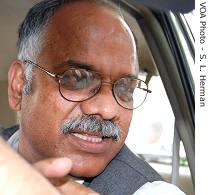-
(单词翻译:双击或拖选)
Kathmandu
15 April 2007
Nepal again has been thrust into political confusion just two weeks after a landmark1 interim2 government was formed. The country's elderly prime minister was a no-show for an emergency session of his cabinet on Sunday. That prevented coalition3 leaders from holding a critical meeting to set a new date for national elections. As VOA's Steve Herman reports from Kathmandu, members of the interim government, including the Maoists, are warning of the dangers of delaying the polls.
A meeting of Nepal's coalition government leaders to decide a new election date did not take place Sunday. Those who gathered for the emergency meeting were stood up by the prime minister.
 |
| Former deputy prime minister Amik Sherchan |
Sherchan told reporters outside the prime minister's office that the group waited more than two hours for Mr. Koirala. But the prime minister did not come into the meeting room and nobody was able to speak with him.
An interim government, including the Maoists and seven other parties, was created April 1st and the Maoists were given relatively5 minor6 posts in the cabinet.
The Maoists have now, threatened to pull out of the interim government if the election is delayed and called for Nepal's unpopular king, Gyanendra, to be dethroned ahead of the polling.
Esteem7 for the royal family plummeted8 following a palace massacre9 in 2001 and the current king's attempt to seize absolute power in 2005.
The Maoists, until last year, waged a decade-long campaign to overthrow10 the monarchy11. The violence claimed 14,000 lives.
Rebel leaders last November agreed to a peace deal to end their uprising and have since registered as a political party for the elections to select lawmakers for a constituent12 assembly. That election had been scheduled for June 20 but Nepal's election commission says due to technical issues and security concerns that is much too soon for nationwide polling.
The Maoists, in recent days, have called the proposal to delay the election a political conspiracy13. They have threatened to resume their struggle outside government, although it is unclear whether that would mean again taking up arms. Their soldiers and weapons have been placed in camps supervised by the United Nations.
Hundreds of Maoists came out of their barracks in southern Nepal on Saturday, in violation14 of an accord signed with the U.N., to protest the delay in the election.
 收听单词发音
收听单词发音
1
landmark

|
|
| n.陆标,划时代的事,地界标 | |
参考例句: |
|
|
|
2
interim

|
|
| adj.暂时的,临时的;n.间歇,过渡期间 | |
参考例句: |
|
|
|
3
coalition

|
|
| n.结合体,同盟,结合,联合 | |
参考例句: |
|
|
|
4
ailing

|
|
| v.生病 | |
参考例句: |
|
|
|
5
relatively

|
|
| adv.比较...地,相对地 | |
参考例句: |
|
|
|
6
minor

|
|
| adj.较小(少)的,较次要的;n.辅修学科;vi.辅修 | |
参考例句: |
|
|
|
7
esteem

|
|
| n.尊敬,尊重;vt.尊重,敬重;把…看作 | |
参考例句: |
|
|
|
8
plummeted

|
|
| v.垂直落下,骤然跌落( plummet的过去式和过去分词 ) | |
参考例句: |
|
|
|
9
massacre

|
|
| n.残杀,大屠杀;v.残杀,集体屠杀 | |
参考例句: |
|
|
|
10
overthrow

|
|
| v.推翻,打倒,颠覆;n.推翻,瓦解,颠覆 | |
参考例句: |
|
|
|
11
monarchy

|
|
| n.君主,最高统治者;君主政体,君主国 | |
参考例句: |
|
|
|
12
constituent

|
|
| n.选民;成分,组分;adj.组成的,构成的 | |
参考例句: |
|
|
|
13
conspiracy

|
|
| n.阴谋,密谋,共谋 | |
参考例句: |
|
|
|
14
violation

|
|
| n.违反(行为),违背(行为),侵犯 | |
参考例句: |
|
|
|















